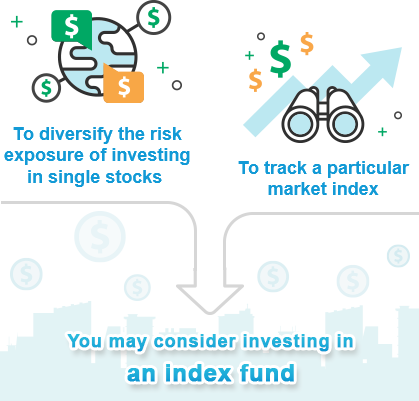Investors should note that investment involves risks (including the possibility of loss of the capital invested), prices of fund units may go up as well as down and past performance information presented is not indicative of future performance. Investors should read the relevant fund's offering documents (including the full text of the risk factors stated therein (in particular those associated with investments in emerging markets for funds investing in emerging markets)) in detail before making any investment decision.
The risks for funds which are index funds include but not limited to:
• Tracking error risk: There can be no assurance that the performance of the relevant fund will be identical to the performance of the relevant index. Factors such as the fees and expenses borne by the relevant fund, the time differences associated with portfolio re-balancing, the prices at which the constituent stocks of the relevant index are acquired or disposed by the relevant fund, the market condition at the relevant time of acquisition or disposal, the index-tracking strategies or financial derivative instruments used will affect the performance of such fund relative to the relevant index.
• Passive investment risk: Fund manager does not have any discretion to select stocks individually or to take defensive positions in declining markets or changes in the composition of the index. Hence, any fall in the relevant index will result in corresponding fall in the value of the relevant fund. The composition of the relevant index may change and stocks currently comprising the relevant index may subsequently be delisted. Other stocks may also be added subsequently to become constituent stocks of the relevant index.
• Concentration risk: The relevant fund may beconcentrated in a single or particular sector(s)or single country/ region. The performance of the relevant fund could depend substantially on the performance of the relevant single or particular sector(s)/market(s) and the relevant fund is likely to be more volatile than a broadbased fund as it is more susceptible to adverse conditions in the relevant single or particular sector(s) / market (s). In seeking to reflect the weightings of constituent stocks of the relevant index, investments of the relevant fund may be concentrated in a single constituent stock or several constituent stocks. The performance of the relevant index and the fund may be significantly affected by the price fluctuation of one or several of the constituent stocks of the relevant index.
What is an Index Fund?
There are all sorts of index funds, which are a type of investment products seeking to track the performance of various market indices. For example, by investing in a Hang Seng Index tracking fund, investors can indirectly invest in the 50 constituent stocks of the index, which cover a range of sectors. General speaking, as the fund’s performance will go up and down with the index, the investment gain or loss will be largely the same as the performance of the index.
Who should consider investing in an Index Fund?
By selecting a fund tracking the target market index, investors can diversify the risk exposure of investing in individual securities with a portfolio that tracks closely the market performance reflected by the index.

Features of Index Funds


The degree of transparency is high as the information about the index methodology is publicly available.




Risks Associated with Index Funds
Index Funds, similar to other investment products, may be exposed to various investment risks, including the following major risks:
- Tracking error risk
While the objective of an Index Fund is to track the performance of the benchmark index as closely as practicable, tracking errors may exist due to factors such as the fund management fee and trading expenses which will affect the performance. - Passive investment risk
Given that an index fund is a passive investment, the fund manager does not have any discretion to select stocks individually or to take defensive positions against volatility amid adverse market changes. - Market risk
An Index Fund may be subject to risks associated with various factors such as the markets and asset classes it is exposed to. Before making any investment decision, investors should read in detail the offering documents (including the full text of the risk factors and the details of fees and charges) of the relevant investment products.
Want to know more about Index Fund ?
